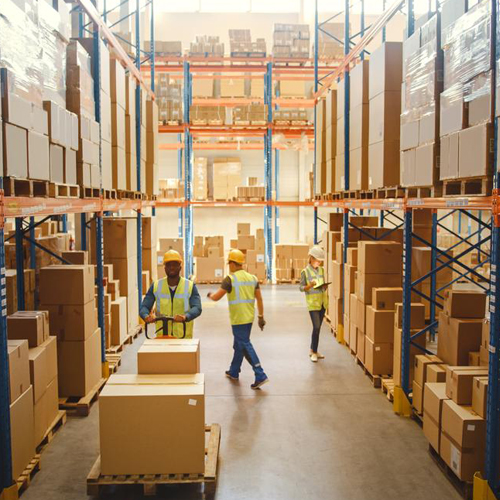Printers are essential in all business activities, work, and personal life. They are powerful tools that support printing documents, invoices, reports, etc. contributing to improving work efficiency and quality of life. To meet the increasing demand for importing printers, SSR Logistics is pleased to provide you with a comprehensive guide on import procedures, and customs procedures to ensure you can carry out the process easily and effectively.
Classification of Printers When Importing to Vietnam
Printers are imported from many countries around the world such as China, South Korea, Japan, and many others. However, the procedures, dossiers, and HS codes for importing printers are similar. When carrying out customs procedures for importing printers, they are classified into two main types:
- Customs procedures for importing printers requiring a permit: In this case, you need to obtain an import permit for the printer.
- Customs procedures for importing printers do not require a permit: For some types of printers, you do not need to obtain an import permit.
The Publishing Department regulates the list of printer types that require import permits to effectively control and manage printing activities in Vietnam.
Printers Requiring Import Permits
- Printers using digital printing technology: Including laser printers, inkjet printers with a printing speed over 50 pages/minute (A4 size) or larger than A3 size, and printers integrated with color photocopying function.
- Industrial printers: Offset printers, flexo printers, rotogravure printers, letterpress printers.
- Color photocopiers and printers with color photocopying functions.
Thus, the main classification factor is based on the printing technology of the machine, regardless of its intended use. This classification aims to meet the control and management requirements for modern printer types capable of high-volume printing.

Import Permit for Printers to Vietnam
Legal Regulations for Importing Printers
The legal regulations governing the procedures for importing printers into Vietnam include:
- Decree 60/2014/ND-CP dated 19/06/2014 by the Government regulates that the age of used imported printers must not exceed 10 years.
- Circular 38/2015/TT-BTC dated 25/03/2015 by the Ministry of Finance, amended and supplemented by Circular 39/2018/TT-BTC dated 20/04/2018, providing detailed regulations on procedures, order of importing printers, and requirements for quality inspection of goods.
- Decision 2479/QD-BTTTT dated 29/12/2017 by the Ministry of Information and Communications on regulations requiring permits for importing printers.
- Circular 16/2015/TT-BTTTT dated 17/06/2015 by the Ministry of Information and Communications guides the procedures and specific conditions for importing printers.
- Decree 43/2017/ND-CP dated 14/04/2017 by the Government regulating the obligation to label goods applied to imported goods as printers.
- Decree 128/2020/ND-CP dated 19/10/2020 by the Government detailing procedures for importing printers.
- Decree 32/2023/ND-CP dated 09/06/2023 updating and adjusting regulations related to importing printers.
Depending on each document, the regulations may adjust the age of machines, import permits, quality inspection, labeling of goods, as well as other procedures in the process of importing printers.
HS Codes and Taxes When Importing Printers
HS Codes When Importing Printers
The HS code plays a crucial role in import procedures, directly affecting import duties, VAT, and related policies. Accurately determining the HS code for printers is extremely important, requiring businesses to clearly understand the product’s characteristics: raw materials, components, and nature of the goods.
According to the current import-export tariff schedule, printers are classified under Chapter 84, specifically headings 8441, 8442, and 8443. However, to determine the detailed HS code for each type of printer, businesses need to rely on the actual functions and structure of the product.
Risks of Misapplying HS Codes
Accurately determining the HS code (commodity code) plays a crucial role in the process of importing printers. However, many businesses remain subjective in applying HS codes, leading to serious consequences affecting their business operations.
Risks of Time and Costs
- Delayed customs procedures: Incorrectly declaring the HS code may cause the shipment to be temporarily detained at the port, prolonging the customs clearance time. The business must bear warehousing costs, loan interest, and the risk of goods damage.
- Costs of rectifying errors: When HS code errors are detected, the business must supplement documents, clarify information, and amend the customs declaration. This process is time-consuming and costly, affecting business progress.
Legal and Financial Risks
- Administrative penalties: According to Decree 128/2020/ND-CP on incorrect HS code declarations, businesses may be fined from VND 2,000,000 to 3 times the tax amount if there is an inaccurate declaration of import taxes.
- Tax code suspension: Repeated violations may lead to the suspension of the business’s tax code, severely affecting its operations.
- Legal disputes: Errors in HS codes can lead to legal disputes with customs authorities, damaging the business’s reputation and brand.
Impact on Business Operations:
- Delayed deliveries: Temporary detention or rectification of information due to HS code errors may cause shipments to be delayed in reaching customers, damaging reputation and affecting revenue.
- Difficulties in production activities: Businesses may lack machinery due to customs clearance delays, resulting in disruptions to production activities and lost business opportunities.
Import Duties for Printers
Import duties are mandatory fees that importers must pay to customs authorities when carrying out procedures for importing printers. Fulfilling tax obligations is a prerequisite for goods to be cleared and circulated in the domestic market.
Import duties for printers include two main types of taxes:
- Import Duty (NK): The tax is calculated directly on the CIF value (cost of goods, freight, and insurance) of the printer. The NK tax rate will depend on the HS code (commodity code) of the imported printer.
- Import Value-Added Tax (VAT): The tax is calculated on the total value including the CIF value and paid import duties. The current import VAT rate is 10%.
The HS codes for printers fall under Chapter 84, headings 8441, 8442, and 8443 in the import-export tariff schedule. The tax rate depends on whether or not there is a certificate of origin (CO). If there is a CO, a preferential special tax rate may be applied.
Note that Decree 44/2023/ND-CP regulating a tax reduction to 8% from July 1, 2023, to December 31, 2023, does not apply to all printer products. Therefore, imported printers are still subject to the 10% VAT rate.
Regulations on Labeling for Imported Printers
When importing printers, applying labels and the content on the labels plays an important role. Below are the relevant regulations regarding the content and location for affixing labels on printers:
Label Content
- According to Decree 43/2017/ND-CP, labels of imported printers need to fully display the following information:
- Name and address of the exporting organization/individual: Including the full name, and specific address (house number, street, area, country) of the manufacturer or exporter.
- Name and address of the importing organization/individual: Including the company name, head office address, and branch address (if any) of the importing business.
- Name and detailed description of the product: Introduce the type of printer, model, functions, and technical specifications (dimensions, weight, capacity, etc.).
- Origin of goods: Clearly state the country of manufacture or assembly of the printer.
Location for Affixing Labels on Goods
The location for affixing labels on printers must meet the following criteria:
- Easily visible and inspectable: Labels must be affixed in a prominent location, easily attracting the attention of inspectors.
- Avoid obstruction: The labeling location must not be obstructed by other parts of the printer or packaging.
- Durability: The labeling location must ensure that the labels do not peel off, tear, or get damaged during transportation and use.
Suggested labeling locations:
- On the printer body (front corner or back panel).
- On the packaging (carton box, wooden crate).
- On the user manual.
Risks of Not Affixing Labels
Failure to comply with labeling regulations for imported printers can lead to serious consequences for businesses, including:
- Fines: According to Decree 128/2020/ND-CP, businesses may be fined from VND 10,000,000 to VND 50,000,000 for violating labeling regulations.
- Loss of tax benefits: Businesses may lose the right to enjoy import tax incentives if they fail to provide complete information on the labels.
- Customs clearance delays: Inspection and verification of label information may cause shipments to be temporarily detained, leading to customs clearance delays and affecting business progress.
- Loss of commercial reputation: Violation of labeling regulations can affect the business’s commercial reputation and erode customer trust.
Compliance with labeling regulations for imported printers is the responsibility and obligation of businesses. Providing complete and accurate information on labels not only helps businesses avoid legal risks but also contributes to protecting consumer rights.
Import Dossier for Printers
When carrying out import procedures for printers, preparing the dossier is very important. The following documents are required in the import dossier for printers:
- Customs Declaration: This is an important document to declare information about the goods and value of the printer.
- Commercial Invoice: This document clearly states the transaction value and details about the printer.
- Bill of Lading: This is a document confirming the transportation of the printer from the exporting to the importing location.
- Packing List: This document lists details about the quantity, dimensions, and weight of the packages.
- Sales Contract (if any): The sales contract stipulates terms of delivery, payment, and import conditions.
- Printer Import Permit: This is the required permit to import the printer.
- Certificate of Origin (C/O) (if any): The certificate of origin determines the place of manufacture of the printer.
- Catalog (if any): This document provides detailed information about the printer.
Although documents like the packing list, contract, and catalog are not mandatory, customs authorities may request them to accurately determine the HS code, and applicable tax rates, and assess the need for an import permit for the printer. Therefore, preparing a complete, detailed import dossier will help expedite customs clearance and avoid unnecessary legal and economic risks. \
Import Procedures for Printers
Obtaining an Import Permit
Decree 32/2023/ND-CP dated 09/06/2023 by the Government regulates the conditional import of printers. Accordingly, importing businesses must obtain an import permit from the competent authority. The import procedure for printers may change depending on actual circumstances and specific requirements.
Import permits for printers are issued for each specific printer, not collectively. The following types of printers require an import permit:
- Platemaking, film recording, zinc recording, and plate-making machines
- Digital printing technology printers, offset printers, flexo printers, rotogravure printers
- Screen printers
- Paper cutting, book folding, bookbinding, casing-in, and stitching machines
- Color photocopiers, printers integrated with color photocopying function
The procedure for obtaining an import permit is carried out online on the National Single Window Portal of the Ministry of Industry and Trade.
Note: Printers integrated with secure fax and telegraph functions also require an import permit.
Authority Issuing Import Declaration Confirmation for Printers
The sole authority issuing import declaration confirmations for printing equipment is the Publishing Department under the Ministry of Information and Communications (according to Circular 03/2015). Address: 10 Thanh Street, Cua Dong Ward, Hoan Kiem District, Hanoi.
Steps for Carrying Out Import Procedures for Printers
Step 1: Declare Customs Declaration
- Prepare complete dossier: printer import permit, commercial contract, commercial invoice, packing list, bill of lading, and certificate of origin (if any).
- Accurately determine HS code and declare detailed, accurate information on the Electronic Customs Declaration System.
- Note: Incorrect declaration may lead to serious legal violations.
Step 2: Submit Customs Declaration
- Print declaration after declaring and submit a dossier to the Customs Sub-Department according to the prescribed stream (red, yellow, green) within 15 days from the declaration date.
- Late submission after 15 days will be subject to penalties under current regulations.
Step 3: Customs Clearance of Declaration
- Customs officials will inspect the dossier and approve customs clearance if complete and valid.
- Pay import duties and fees to complete customs clearance procedures.
- In special cases, goods may be released to bonded warehouses before completing customs clearance procedures.
Step 4: Bring Goods to Warehouses and Use
- Complete settlement of declaration and related customs procedures.
- Prepare release orders and transportation to receive goods from the supervised area.
- Comply with regulations on storage and use of imported printers under law.
Important Notes When Carrying Out Import Procedures for Printers
With experience accumulated from assisting customers in carrying out customs procedures for importing printers, the team of experts at SSR Logistics has gained valuable insights. We would like to share some important notes that should be taken into account when importing this commodity to ensure smooth import operations and compliance with legal regulations.
- Regarding the scope of entities allowed to import printers, according to current regulations, only the following entities are permitted: Printing establishments legally established and operating in Vietnam; Import-export trading companies for printing equipment by specialized legal regulations; and Organizations with legal entity status allowed to use printers for internal operations.
- To import printers, businesses are required to obtain an import permit. This permit is issued separately for each specific printer according to the identification code of the printing machine. In the case of importing spare parts/replacements for printers, an import permit is not required.
- Regarding customs clearance procedures, printers are only cleared and shipments are released at the border gate when the business has fully fulfilled all relevant financial obligations such as paying all import duties, value-added tax, and other fees by customs regulations.
- Regarding goods labeling requirements, when importing printers, importers must fully comply with the goods labeling regulations under Decree 43/2017/ND-CP of the Government. Proper labeling will facilitate inspection by customs authorities.
- One of the most important requirements is accurately determining the HS code (Harmonized Commodity Description and Coding System) for the imported printer. The correct HS code will ensure the application of the proper import tax rate while avoiding administrative penalties for incorrect code declaration.
SSR Logistics hopes that the above notes will be useful for businesses’ printer import operations. The team of experts at SSR Logistics is ready to answer any questions and professionally support businesses throughout the entire process of carrying out customs procedures for importing printers to Vietnam.
SSR Logistics – Comprehensive Customs Clearance and Printer Import Permit Services
With years of experience in the logistics field and a team of professionally trained staff well-versed in laws and regulations on importing printers to Vietnam, we ensure to provide you with the most professional and accurate services. Moreover, we always strive to find the optimal solutions to shorten the time required to complete customs procedures, helping you save time and costs. SSR Logistics is committed to delivering the most perfect service to you.
 Comprehensive Printer Import Customs Clearance Services to Vietnam
Comprehensive Printer Import Customs Clearance Services to Vietnam
Services provided by SSR Logistics:
- Consulting on customs procedures for importing printers to Vietnam
- Preparing complete and accurate customs dossiers
- Electronic customs declaration
- Resolving any issues arising during customs clearance
- Consulting on import duties and related fees
- Cargo transportation services to Vietnam
Through this article, SSR Logistics hopes that valued customers have overview of the conditions, processes and customs procedures when importing printers to Vietnam. For more articles, please visit our Logistics Knowledge section.
SSR looks forward to becoming your reliable logistics partner, providing optimal solutions for your importing and exporting business. Should you have any question regarding our services, please feel free to contact us for specific advice.
With our experienced team, extensive network and flexible shipping & customs solutions, SSR Logistics is confident to deliver excellent services to our clients.
Businesses that need customs and import-export, please contact SSR Logistics via Hotline (+84) 911 988 484 or leave your information here for specific advice.
With a modern warehouse system and experienced transportation staff, SSR Logistics provides a variety of additional services such as: customs clearance, warehouse leasing, domestic transportation, international transportation by sea and air, and international express delivery.









